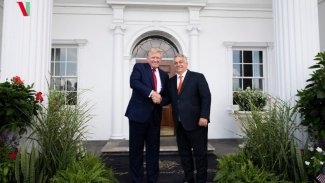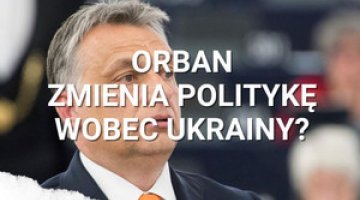Hungary’s strained relations with the US: betting it all on Trump

Since Russia invaded Ukraine in 2022, Hungarian-US relations have deteriorated even further. Hungary’s close cooperation with Russia and China had already caused concern in Washington. In addition, successive Democratic administrations had criticised Hungary’s democratic backsliding under Viktor Orbán. Over the past few months, Hungary’s negative stance towards the West’s support for Ukraine, its stalling on the ratification of Finland’s and Sweden’s membership in NATO, its failure to take any steps to reduce its energy dependence on Russia and curb Moscow’s influence in the country, and its government’s stoking of anti-US sentiment have caused growing frustration in Washington and prompted the administration of Joe Biden to resort to several additional measures to put pressure on its ally.
Orbán’s government seems resigned to this breakdown in relations with the US, and only makes adjustments when directly threatened with sanctions. It seemingly believes that the only chance to improve relations with Washington will come if Donald Trump returns to power after next year’s presidential election. Therefore, it has been investing considerable resources in building relations with the Trump-affiliated part of the Republican Party, seeking to find common ground mainly on the ideological level. At the same time, it has been working to reinforce the desired trends in the Republicans’ approach to international affairs, for example by promoting calls for the US to reduce its military support to Ukraine and make concessions to Russia.
US pressure on Hungary
Immediately after Russia launched its invasion of Ukraine, Hungary decided not to supply Ukraine with weapons and emphasised its neutral stance towards both sides in the conflict; however, it did not openly contest the West’s policy towards the war, nor did it block the EU’s and NATO’s decisions on key issues, including EU sanctions against Russia over its invasion. For its part, the US has attached great importance to maintaining allied unity vis-à-vis Russia. Nevertheless, since the autumn of 2022, the attitude of the government in Budapest began to increasingly diverge from the position of the West, which was reflected in its harsh criticism of the allies’ actions with regard to the war.[1] After a period of some restraint in its contacts with the Kremlin, the Hungarian government restored its close relationship with Russia, which culminated in Orbán’s meeting with Vladimir Putin in Beijing in October 2023.[2]
Despite numerous declarations, Hungary has not made any clear progress in its efforts at energy diversification. Since February 2022, gas and oil supplies from Russia have even temporarily increased. Hungary has also failed to take any steps to curb the Kremlin’s influence in the country while accusing the US of interfering in its internal affairs. Hungary (along with Turkey) delayed Finland’s NATO membership for months, and it still has not ratified Sweden’s accession. It has also repeatedly obstructed Ukraine’s efforts to forge closer ties with the EU and NATO: it has now voiced its opposition to the EU’s plans to open accession negotiations, provide Ukraine with a package of financial support until 2027, and release further tranches of aid from the European Peace Facility.
Consequently, in recent months the US has increasingly signalled its dissatisfaction with both the Orbán government’s policy towards the Russian-Ukrainian war and its moves on the domestic arena. In April, the US sanctioned the Russia-controlled International Investment Bank (IIB), which had its headquarters in Budapest. Following Russia’s invasion of Ukraine in 2022, the Czech Republic, Slovakia, Bulgaria and Romania withdrew their shares from this bank. The US government accused IIB, in which Hungary held a 25-percent stake, of engaging in intelligence activities; it saw the relocation of its headquarters from Moscow to Budapest in 2019 as a tool for Russia to exert influence on Hungary. The sanctions announced by the US Department of the Treasury also targeted several high-ranking officials working for the IIB, including a Hungarian citizen. As a result, Hungary relinquished its shares in the bank.
In an unusual step against an allied country, the US has also imposed harsh restrictions on arms sales to Hungary. According to US media reports, the US Senate has blocked the authorisation of the sale of a $735-million arms package to Hungary that includes HIMARS rocket launchers and ammunition. In a statement to the Washington Post, Republican Senator James E. Risch said that this package should be unblocked only if Hungary approved Sweden’s accession to NATO.[3]
Other US measures have involved changes to the conditions of entry into the US for Hungarian citizens. In August, the US administration announced its decision to restrict their rights under the Visa Waiver Program. As a result, Hungarian passport holders can now obtain permits for stays of no more than 90 days in the United States, which are granted through the Electronic System for Travel Authorisation (ESTA) on a one-time basis and for one year. Previously, permits for unlimited numbers of trips were valid for two years, as is the case with the other 39 countries included in the Visa Waiver Program. This decision was related to the simplified procedure of applying for dual citizenship, which the Hungarian government introduced in 2011 for ethnic Hungarians who live abroad. More than one million members of the minorities that live mainly in Romania, Serbia and Ukraine have so far obtained Hungarian passports, and have thus become eligible for the simplified US visa procedure. The US administration’s position is that the identity of those people has not been verified to the full extent of the security procedures that the Visa Waiver Program envisages, and that the Hungarian government has ignored repeated warnings on this issue. For its part, Hungary has argued that the data of Hungarians with dual citizenship should be kept confidential for the sake of their security in the neighbouring countries.
According to media leaks the US administration is preparing sanctions against government-linked Hungarian citizens who have engaged in corrupt practices.[4] This would not be unprecedented: back in 2014 the US imposed an entry ban on six employees of Hungary’s Tax and Customs Administration.[5] Such actions may be increasingly coordinated with America’s other allies. Orbán’s meeting with Putin in Beijing on 17 October was followed by an informal gathering of the ambassadors of NATO countries and Sweden at the US embassy in Budapest.
US officials have also begun to influence Hungarian public opinion more actively, especially since Ambassador David Pressman arrived in Budapest in September 2022. He has criticised Hungary’s foreign policy more sharply than his predecessors while making no secret of his liberal worldview. In April this year, the US embassy became involved in a pro-Ukrainian poster campaign whose slogan of ‘Russians go home!’ referred to the slogan of the 1956 revolution that Orbán himself invoked in his 1989 speech at the re-burial of Imre Nagy, which is regarded as the beginning of the current prime minister’s political career. Pressman also participated in the Budapest Pride Parade in July, which the capital city’s opposition-led government supported in a show of defiance against the central government’s policy towards the LGBT+ communities.
Orbán’s efforts to court the Republicans
In response to these moves, the Hungarian government has sought to discredit the US’s actions by insisting that they are motivated solely by ideological differences, rather than a rift over foreign and security issues or Hungary’s democratic backsliding. For months, the government and pro-government media have repeatedly accused the US of interfering in Hungary’s internal affairs while branding their domestic political rivals as the ‘dollar opposition’. The US billionaire, liberal and philanthropist George Soros is still public enemy number one in Hungary.[6]
Faced with mounting pressure from the United States and deepening isolation in the EU and NATO, the government in Budapest seems to be pinning its last hopes on Trump’s return to power. During his presidency in 2017–21, the Orbán government received more leniency from the US administration. At that time, Washington limited its criticism of Hungary’s domestic policy: for example, it did not protest the expulsion of the US-registered Central European University from Budapest when it was forced to relocate to Vienna as a result of administrative actions taken by the Hungarian government. In 2019 Orbán paid his only visit to the White House in his premiership, during Trump’s term in office. The Hungarian prime minister was also the only European leader to lend his unequivocal support to Trump in his 2020 election defeat. Since Russia’s invasion of Ukraine, Orbán has repeatedly stressed that the war would not have happened if Trump were still in power.
The Hungarian government has been seeking to build an image in the US of Hungary as the guardian of traditional family and Christian values, a country that resists cultural change associated with notions such as ‘wokeness’ and gender, and is opposed to migration. Meanwhile, for the Republican Party’s pro-Trump faction, Hungary’s example is useful for shaping public debate by showing that such views are not exclusive to extremist politicians, and are espoused by one of Europe’s longest-ruling political parties.
The recent organisation of the Conservative Political Action Conference (CPAC) in Budapest is a prime example of Fidesz’s courting of the Republican Party. This annual convention of conservatives, which has been held since the 1970s, is hosted by the American Conservative Union (ACU), whose main European partner is the Hungary-based Center for Fundamental Rights (CFR). This government-friendly think tank, which is largely financed through public subsidies, has already organised two rounds of CPAC together with the ACU in the Hungarian capital, with the aim of making Budapest an international bastion of ultra-conservatives. The Fidesz government has also been seeking to influence discussions within the US right through measures such as generous scholarship programmes for US conservatives and the cooperation between the Danube Institute in Budapest and the Heritage Foundation, a think tank that wields influence in Republican circles. Hungary’s message to its US partners highlights the need to end support for Ukraine and reach an agreement with Russia.
Hungary has managed to enlist the support and influence of Tucker Carlson, a media icon in pro-Trump circles. His support for Orbán is not entirely selfless: the Hungarian government has funnelled $265,000 to Policy Impact Communications, a Washington-based organisation which is run by the presenter’s father, to carry out wide-ranging lobbying activities – or as it puts it: “to support its current goals to improve US-Hungarian relations by coordinating, facilitating and managing government and media affairs”.[7] In return, Orbán can expect to receive Carlson’s praise of Fidesz’s policies and also to reach a wide audience through his interviews with Carlson. For example, in late September Carlson published a 30-minute interview with Orbán on X (formerly Twitter), which was viewed by around 100 million people over a two-day period.[8] In that interview, the Hungarian prime minister said that NATO should not seek the accession of Ukraine, claiming that this would pose a threat to the security of its member states, but that instead it should strive to reach an agreement with Russia on a new security architecture. The social media account of this controversial former Fox News presenter has high viewing figures, which is particularly valuable to Orbán in the context of Hungary’s isolation in the Western world.
Besides Carlson, Elon Musk is another well-known American who is not directly connected to politics, but has a large influence on public opinion through the media and is openly sympathetic to the Hungarian government. This innovator and entrepreneur, who also happens to be the world’s richest man, has emerged as one of the leading figures in the US conservative media following his takeover of Twitter. Musk regularly comments on posts by well-known right-wing politicians, including Orbán. For example, in September he endorsed the Hungarian prime minister’s remarks in which he refused to accept the EU’s migration pact. In fact, the celebrity billionaire’s interactions with Hungarian politicians are not limited to social media: in September, the Hungarian President Katalin Novák visited the headquarters of his business empire in Austin. She spoke to Musk mainly about the demographic crisis, which both of them recognised as a much more serious problem than climate change. The Hungarian government has been trying to directly influence US and international public opinion by exploiting the billionaire’s popularity.
Prospects for Hungarian-US relations
Recent pressure from Washington has brought about changes in Hungary’s policies only when the US resorted to direct restrictions. This was the case with the International Investment Bank, which the US perceived as a Russian outpost: the Hungarian government withdrew from it only after the US targeted it with sanctions. The other steps taken by the US should be seen more as warnings to Hungary as they have no direct effect on the government, even though they are detrimental to the country’s position and burdensome for part of its population. However, Orbán does not seem to have any intention of either refraining from actions that are seen as detrimental to the interests of Hungary’s allies (such as obstructing Ukraine’s cooperation with the EU and NATO) or curtailing his close ties with countries that have been pursuing hostile policies towards the West. This attitude also stems from the fact that given Hungary’s growing marginalisation, Orbán sees the only chance of advancing his vested interests in threatening to use his veto on matters of strategic importance to the country’s allies in the EU and NATO.
It appears that the Fidesz government is pinning its last hopes for overcoming the crisis in relations with the US on Trump’s possible return to power, or the victory of another potential Republican candidate: for example, President Novák met Florida Governor Ron DeSantis as recently as March. However, even if there is a change of administration in Washington, it is not a foregone conclusion that Hungarian-US relations will improve dramatically. Indeed, some representatives of the Republican Party in Congress are critical of Hungary’s pro-Russian, and especially pro-Chinese moves; their common ideological ground may prove insufficient unless there is a course correction in Hungary’s foreign and security policies.
[1] A. Sadecki, ‘Hungary’s campaign against the West’s Russia policy’, OSW, 28 September 2022, osw.waw.pl.
[2] A. Sadecki, F. Rudnik, ‘The Orbán–Putin meeting in Beijing: Hungary drifting away from the West’, OSW, 19 October 2023, osw.waw.pl.
[3] J. Hudson, L. Morris, ‘GOP senator blocks arms sale to Hungary for stalling Sweden’s NATO bid’, The Washington Post, 14 June 2023, washingtonpost.com.
[4] ‘US briefs allies about possible sanctioning of Hungarians’ [in:] S. Panyi, Goulash: US sanctions vs Hungarians, crypto & money laundering, VSquare’s Goulash Newsletter, 12 October 2023, vsquare.org.
[5] A. Sadecki, ‘Tensions between Hungary and the US’, OSW, 22 October 2014, osw.waw.pl.
[6] Idem, ‘The anti-Soros campaign in Hungary’, OSW, 5 April 2017, osw.waw.pl.
[7] ‘Exhibit B to Registration Statement’, U.S. Department of Justice, 15 May 2019, efile.fara.gov.
[8] Tucker Carlson’s interview with Viktor Orbán, 30 August 2023, twitter.com/TuckerCarlson.




